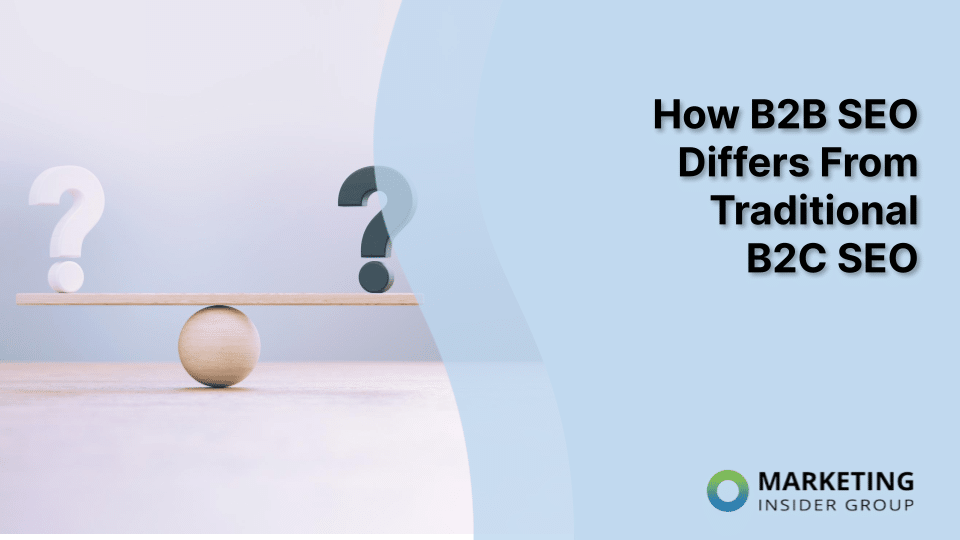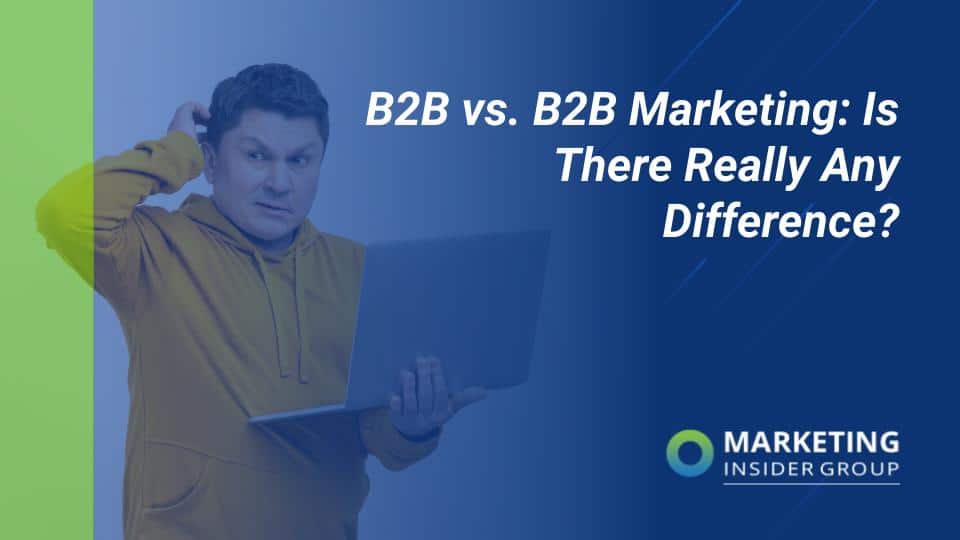
How B2B SEO Differs From Traditional B2C SEO
SEO is the cornerstone of online success, but it’s not a one-size-fits-all solution. For businesses, understanding the nuances of B2B SEO is essential, as it significantly differs from B2C SEO. Once you grasp some of the key differences, you’ll be more effective with your efforts.
The Distinct Focus of B2B SEO
B2B SEO operates within a distinct paradigm, primarily due to the nature of the target audience. Unlike B2C, where the consumer base can be broader and more diverse, B2B marketing usually centers on a narrower niche that’s fairly easy to quantify, measure, and target. The focus lies in catering to businesses and key decision-makers rather than individual consumers.
“Unlike B2C SEO, which often targets high-volume, broad keywords, B2B SEO strategies frequently focus on lower-volume, longer-tail keywords,” Marcel Digital explains. “These are highly specific phrases that may not generate a large amount of overall search traffic, but they attract a more targeted audience that is likely closer to the point of purchase.”
Zooming in with this sort of laser precision is both a challenge and an advantage. It’s up to the SEO strategist or marketing professionals heading up the SEO efforts for each company to make sure they’ve done adequate research before proceeding.
Here are some other distinct ways in which B2B SEO stands out:
Understanding the buyer’s journey.
In the B2B landscape, the buyer’s journey is markedly different from the impulse-driven consumer behavior seen in B2C. Business decisions typically involve multiple stakeholders and a longer purchasing process. Therefore, B2B SEO must align content and keyword strategies with the stages of this elongated buying cycle, nurturing leads through informational, consideration, and decision-making phases.
Content tailored for B2B audiences.
Crafting content that speaks the language of businesses is pivotal in B2B SEO. Unlike B2C content, which might focus on emotional triggers or lifestyle appeal, B2B content leans heavily on providing valuable information, industry insights, and solutions tailored to the specific challenges faced by businesses. This necessitates a deeper understanding of the target audience’s pain points, industry trends, and the ability to showcase expertise and authority.
Relationship building and lead generation.
One of the standout aspects of B2B SEO is the emphasis on relationship building. While B2C transactions might be more transactional, B2B interactions often involve nurturing long-term partnerships. SEO efforts in the B2B space extend beyond mere website traffic. They aim to generate qualified leads and establish credibility, trust, and authority within the industry.
Navigating challenges and maximizing opportunities.
Navigating the nuances of B2B SEO can present challenges, such as longer sales cycles, niche markets, and smaller search volumes for specific keywords. However, these challenges open doors to unique opportunities. Lower competition for highly specialized keywords allows businesses to attain higher visibility among a more relevant audience, thus maximizing the chances of conversion.
6 Strategies for Success in B2B SEO
To excel in B2B SEO, your business really needs to focus on and emphasize strategies like:
1. Detailed Keyword Research
Prioritize long-tail keywords that align with the needs and queries of B2B buyers. Because the buying process is much longer and involves more stakeholders than a traditional B2C purchase process, you have to get the keyword research right.
2. Content Quality and Relevance
Develop content that addresses pain points, offers solutions, and positions the business as an industry authority. You may even consider writing content for different types of stakeholders. For example, some content might center around middle managers while other content focuses on C-suite executives.
3. Optimize for Mobile and User Experience
Ensure seamless accessibility across devices and an intuitive user interface. B2B search is a little different in that there’s still a relatively large desktop presence (since they often use company laptops and computers to conduct searches). However, with the rise of remote work, mobile absolutely must be a priority as well.
One extremely important thing you can do is improve your website’s loading speed as it directly impacts user experience and search rankings. Compress images, leverage browser caching, and use Content Delivery Networks (CDNs) to enhance speed. These are pretty technical moves, so you may need to outsource these tasks to a web developer. You won’t regret spending money on this – it affects everything down the line, including your search rankings.
4. Link Building and Networking
Cultivate relationships within the industry to earn backlinks and enhance domain authority. Whether it’s writing for guest publishers, setting up blogging relationships, or having someone pitch your content as resources to journalists and other bloggers, there’s real power in generating backlinks for your website URLs.
Backlinks are a huge authority signal for Google. The algorithm makes the assumption that a website with lots of links and traffic coming from other websites that already have authority is a good sign. It’s the principle of transferred authority. So by securing backlinks from websites with a high domain authority (DA), you can basically tap into their authority and leverage it to your benefit.
5. Optimize for Local SEO
If your B2B services cater to specific geographic locations, optimize your website for local SEO by including location-based keywords. You should also create Google My Business listings and get listed in local directories. Google is very much focused on driving local traffic these days, so you need to do this sooner rather than later. It’s one of the best ways to position your business for relevant search in your market.
6. Analytics and Iteration
Constantly analyze performance metrics to refine strategies and adapt to evolving trends. SEO isn’t a “set it and forget it” investment. You need to constantly keep tabs on what’s happening so you can make small optimizations and improvements.
Adding It All Up
While the principles of SEO remain consistent, the strategies and nuances differ significantly between B2B and B2C environments. Understanding and adapting to these distinctions is very important for businesses aiming to carve out a niche and achieve success in the competitive B2B landscape. While the face of SEO is constantly changing, the importance is only increasing. Let this article serve as a starting point as you plan out new initiatives!






